unit 3 Warming up and reading[上学期]
文档属性
| 名称 | unit 3 Warming up and reading[上学期] | 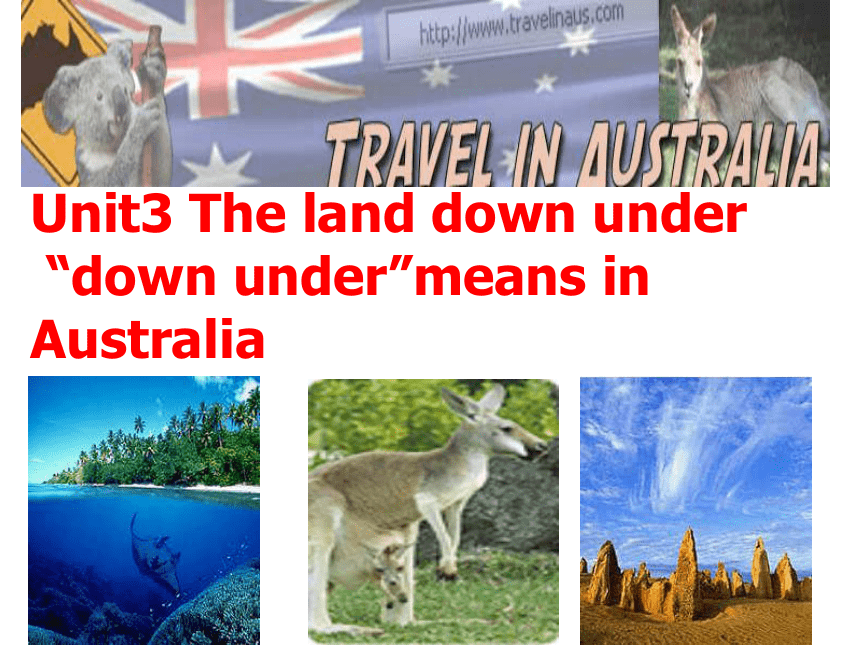 | |
| 格式 | rar | ||
| 文件大小 | 1.4MB | ||
| 资源类型 | 教案 | ||
| 版本资源 | 通用版 | ||
| 科目 | 英语 | ||
| 更新时间 | 2006-11-01 09:05:00 | ||
图片预览

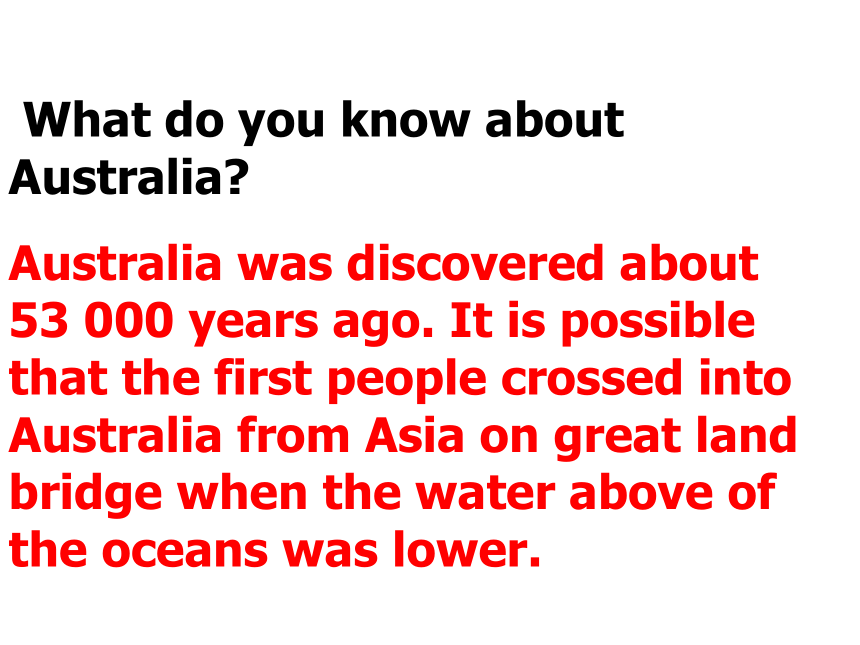
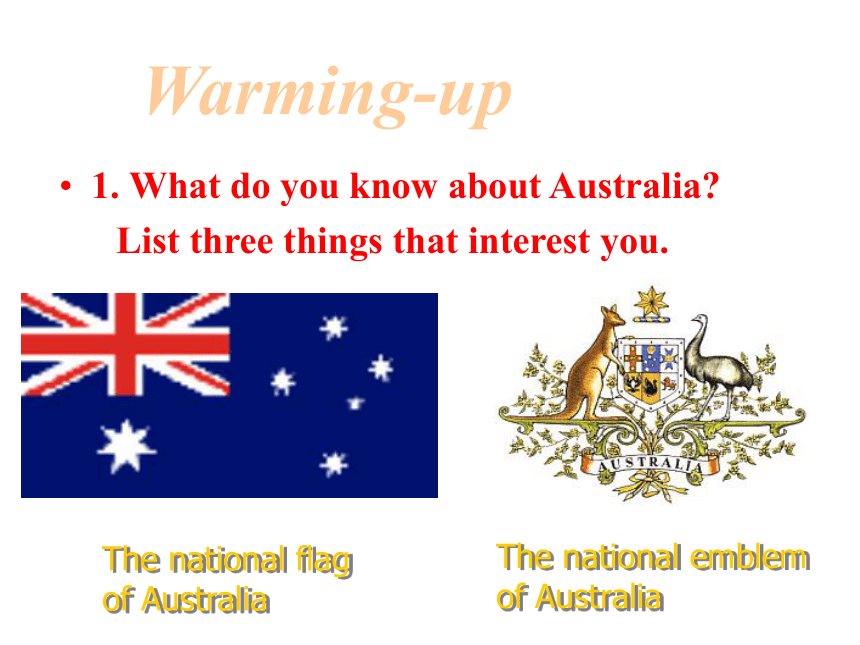
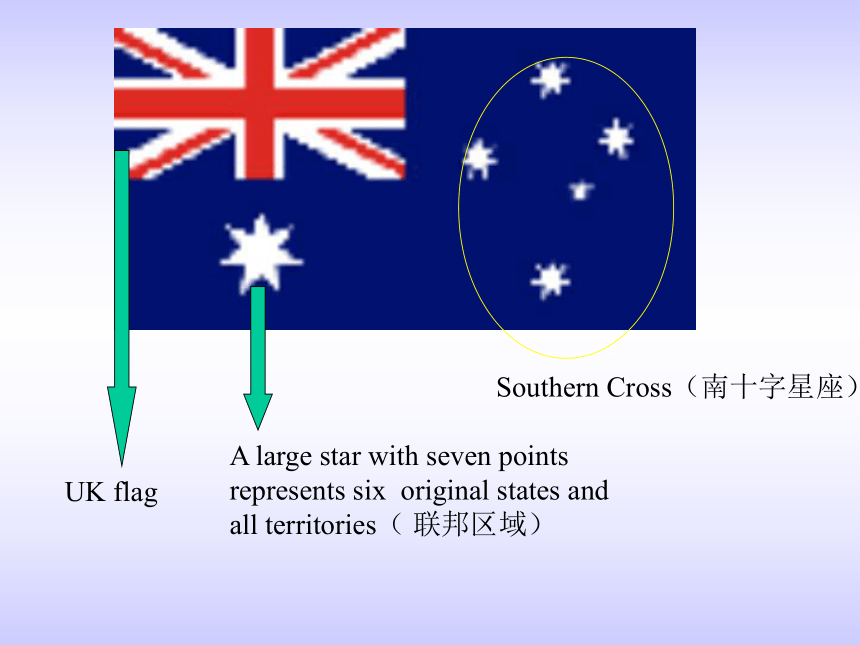
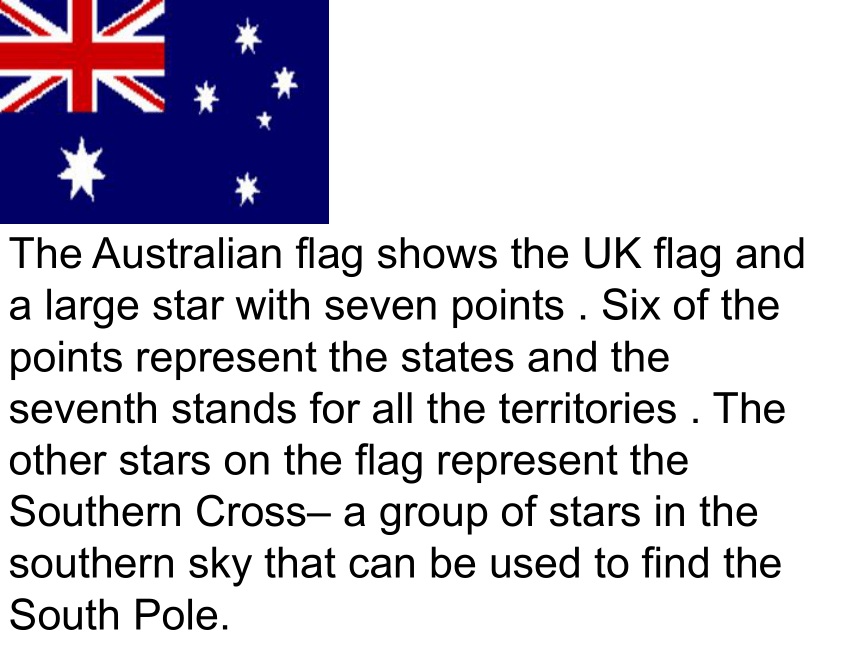
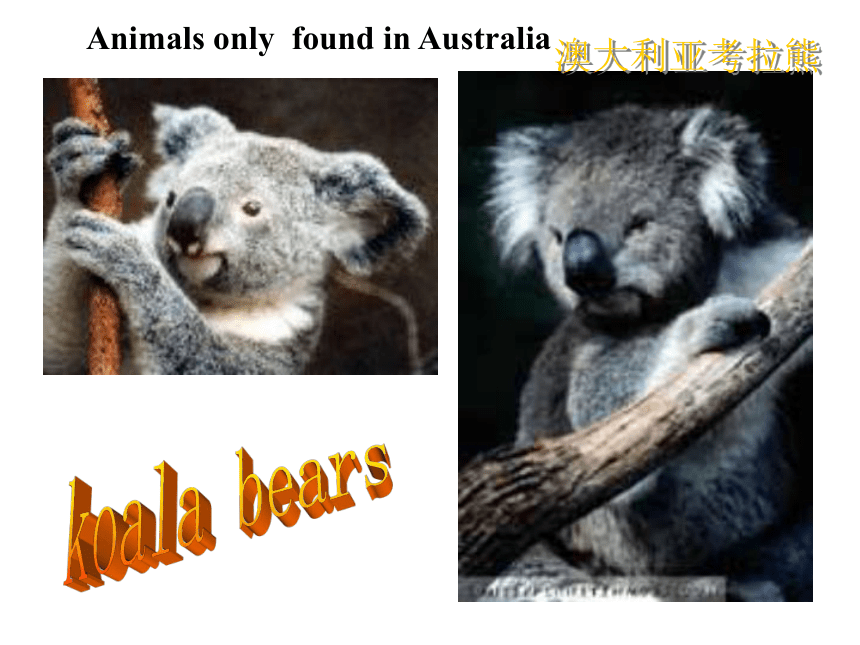
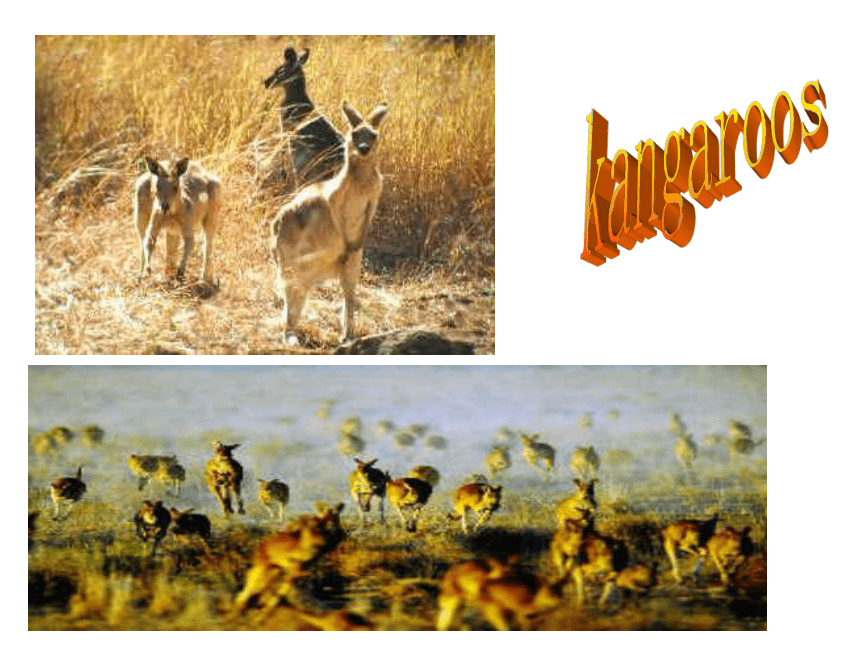
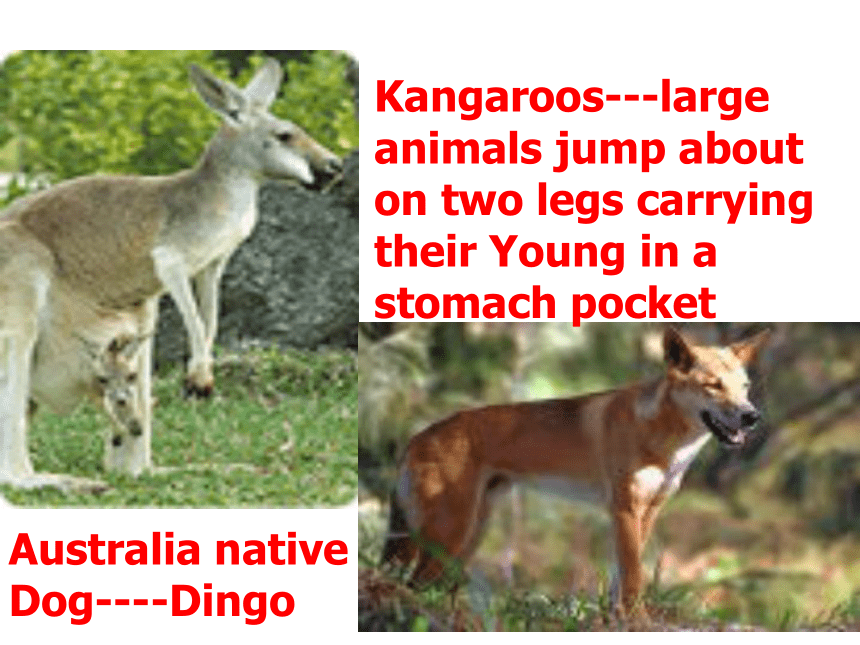
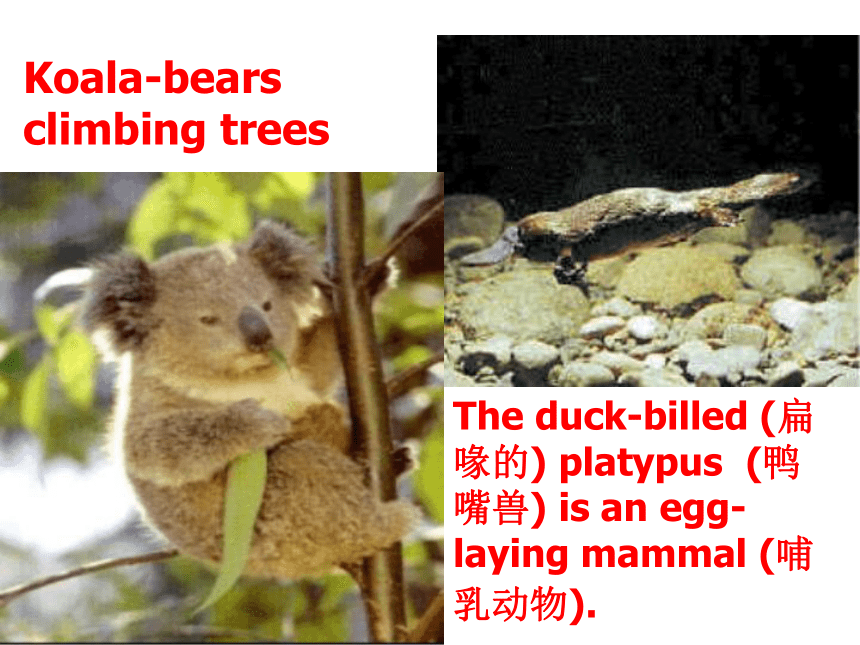
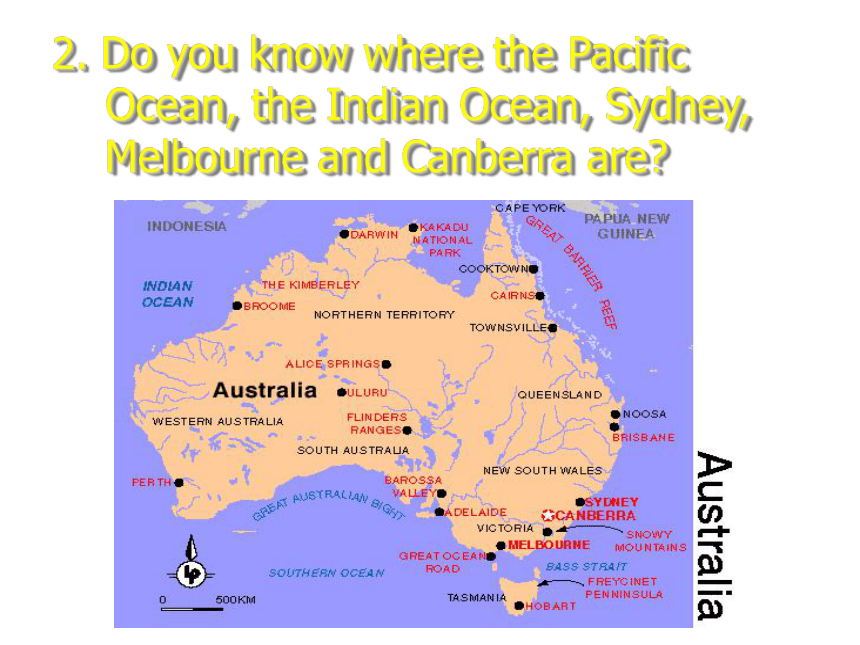
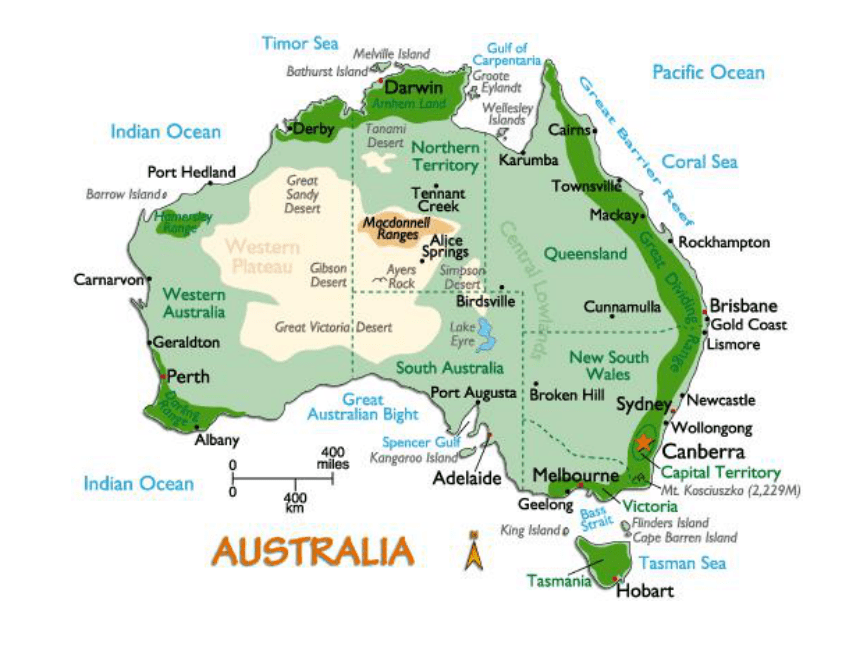
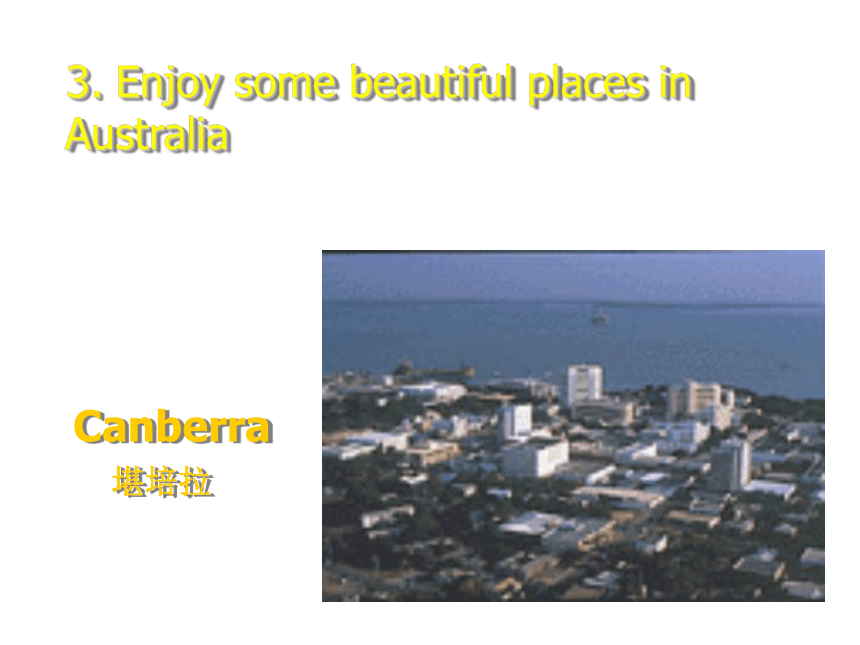
文档简介
课件42张PPT。Unit3 The land down under
“down under”means in Australia What do you know about Australia?
Australia was discovered about 53 000 years ago. It is possible that the first people crossed into Australia from Asia on great land bridge when the water above of the oceans was lower. Warming-up 1. What do you know about Australia?
List three things that interest you.The national flag
of AustraliaThe national emblem
of AustraliaUK flagA large star with seven points
represents six original states and
all territories( 联邦区域)Southern Cross(南十字星座)The Australian flag shows the UK flag and a large star with seven points . Six of the points represent the states and the seventh stands for all the territories . The other stars on the flag represent the Southern Cross– a group of stars in the southern sky that can be used to find the South Pole. koala bears澳大利亚考拉熊 Animals only found in AustraliakangaroosKangaroos---large animals jump about on two legs carrying their Young in a stomach pocketAustralia native
Dog----Dingo
The duck-billed (扁喙的) platypus??(鸭嘴兽) is an egg-laying mammal (哺乳动物). Koala-bears climbing trees2. Do you know where the Pacific
Ocean, the Indian Ocean, Sydney,
Melbourne and Canberra are?
Canberra
堪培拉 3. Enjoy some beautiful places in Australia Capital city-- CanberraSydney Opera House 悉尼夜色迷人 The Great Barrier Reef 大堡礁 在大堡礁潜水 Melbourne 墨尔本墨黑河beautiful scenery in AustraliaPeople love outdoor activitiesA quiz about Australia:Decide the following statements “ T ” or “F” after listening to the recorderThe capital of Astralia is Sydney, which is perhaps Australia’s most famous city.
The Australian flag shows the UK flag and seven stars. Six of the stars represent the states and the large star stands for all the territories.
The first Australians were the European explorers.F F F In 1770,captain James Cook claimed the west of the continent for the British Crown.
Australia Day is on January 26.
The Constitution stated that all men in the Commonwealth of Australia enjoyed the same rights.
After the First World War, Australia began to transform itself into a modern country.
“G’day mate” means “good day friend” .
F TF F TMatch the following by scanning the text: In 1770Captain James Cook claimed the east coast of the continent for the British Crown.Over the next 80 yearsAbout 160,000 prisoners were sent to Australia.In 1901The Commonwealth of Australia was formed.In the 1930sThe country suffered from the Great Depression. 5000 years agoThe first people came to the continent.Outline How large is Australia?
What’s the capital of Australia?
What does the Australian flag look like?When was Australian founded?
Who lives in Australia?How is Australian English different from
British and American English?outlinehistorylanguageFinish the table in the printed paper:A Nation’s PortraitBodyTopicsLocationNational flagOfficial languagestwo territoriesThe Pacific OceanIn 1901AboriginesCareful readingRead the passage and answer the following questions:1. Which is the national flag of Australia and what do the symbols on the Australian flag represent?
The Australian flag shows the UK flag and a large star with seven points. Six of the points represent the states and seventh stands for all the territories.The other stars on the flag represents the Southern Cross – a group of stars in the southern sky that can be used to find the South Pole.Why were prisoners sent to Australia after 1788? Where were they from?
The American War of Independence made it impossible for England to send prisoners to North America. They were from England.What happened to the original Australians when the European newcomers arrived?
They had to leave their land and their land was taken away from them. What was the problem with Australia's Constitution?The Constitution governing six states stated that men were free and equal, explained their base civil rights and described the new government. But aborigines and other non-Europeans did not enjoy the same rights.5. How did the two World Wars change Australia?After the First World War, the country experienced social and economic unrest and suffered from the Depression of the 1930s. After the Second World War, Australia began to transform itself into the modern country as it is today.
6. How does Australian English differ from British English?Australian English differs from British English in pronunciation and some of the vocabulary.Table 2Six of the points … and the seventh ….The
other stars on the flag represent …European explorersEnglish prisonersWhen England couldn’t send prisoners to
North America ,Australia was chosen as a new
placeThey were moved and had their land taken
away from them.Aborigines and other non-Europeans didn’t
enjoy the same rights.Australia transformed itself into the modern
country as it is today.In pronunciation and some of the vocabulary.Before the nation was foundedAborigines and Torres Strait Islanders
cameEuropean explorers arrivedSpanish ;Portuguese,Dutch,BritishCaptain Cook claimed….for the British
Crown.The first fleet of 11 ships arrived160,000prisoners were sent A nation of prisoners After the nation was foundedExperienced social and economic unrest
Suffered from the Great Depression of the 1930s
transform itself into the modern country
People from 200 countries move
passed laws to strengthen the rights of …the Aborigines; Torres Strait Islanders,Spanish; Portuguese and Dutch
other countriesdiverse society ?Read the story about Australia and then tell
whether the sentences are true(T) or false(F).be made up of 由……组成
e.g. Senior Grade Three is made up of 15 classes.
The medical team is made up of three doctors and
ten nurses.
make up组成, 虚构,编造;化妆;补偿,弥补;凑钱
e.g. 1.In Britain today, women take up 44%
of the workforce.
2.It is very hard to make up the quarrel
between the couple.
3.Don’t make up any excuse to cheat me.
4.I find no time to make myself up every day.
5.Hard work can make up for a lack of
intelligence.
6. Have you made up the money for your class?
Language pointsChoose the right answers.2. represent 代表,象征; 表现; 描绘,塑造; 声称e.g. The moon represents my heart.I’d like to thank you representing my whole family.
=I’d like to thank you on behalf of my whole family.
He represented himself as a wealthy man, but in fact he was as poor as a church mouse.
representation n.
representative adj./ n.Notes a wrongly pronounced sound highly praised deeds3.stand for 象征,代表; 支持; e.g. What does WTO stand for? It stand for World Trade Organization.Before we elect him, we want to know what he stands for.4.claim vt.&n.声称,自称; 要求, 认领;主张e.g. Don’t claim to know what you don’t know. 不要强不知以为知
Has anyone claimed the watch?Did you claim on the insurance after your car
accident?
She claims that she is related to the Queen.
She claims to be related to the Queen.
C)He is quite experienced in this kind of work.5. ① as a consequence= in consequence/as a resulte.g. After graduation, he became quite lazy. As a consequence, he lost what he owned. ② as a consequence of =as a result of/because of
/due to/owing toe.g. As a consequence of his rudeness, he was fired by his boss.Note making6. have an influence on/upon=have an effect on/upone.g.1) I don’t think this kind of education system will have a great influence on our school.
2) SARS has a strong influence on human
behaviour.
influence sb./sth.affect sb./sth.7.transform…into… 转换, 改变, 改造, 使...变形 [(+into)]
e.g. A steam engine transforms heat into power.
e.g. The Greens have transformed their garage into a
guest house.A generator( 发电机) transforms mechanical energy into electricity.8. Differ from=be different from不同;不像;相异[(+from)]
e.g. We differ from each other in tastes.②意见不同(from/with)
e.g. We differ from/with him on that problem.①不同,相异 A differ from B in…
She differs from me in many ways.
9.resemble vt. 相似, 像,类似 [(+in)]
He strongly resembles his father in appearance
10.surround 包围 surround sb./ sth. with
e.g. They have surrounded the town with troops.
他们出动军队包围了该城。
surround 常用于被动语态中 “被……包围
The house is surrounded by/with high walls.
1. make it + n./adj.+ (for sb.) + to do sth. / that clause
e.g. She made it clear that she objected to the
proposal.
2. 肯定句(延续性动词) …untill / till …
e.g. It may last till Friday.
They worked until late into the night.
They didn’t start to work until midnight.Two important sentence patterns:
“down under”means in Australia What do you know about Australia?
Australia was discovered about 53 000 years ago. It is possible that the first people crossed into Australia from Asia on great land bridge when the water above of the oceans was lower. Warming-up 1. What do you know about Australia?
List three things that interest you.The national flag
of AustraliaThe national emblem
of AustraliaUK flagA large star with seven points
represents six original states and
all territories( 联邦区域)Southern Cross(南十字星座)The Australian flag shows the UK flag and a large star with seven points . Six of the points represent the states and the seventh stands for all the territories . The other stars on the flag represent the Southern Cross– a group of stars in the southern sky that can be used to find the South Pole. koala bears澳大利亚考拉熊 Animals only found in AustraliakangaroosKangaroos---large animals jump about on two legs carrying their Young in a stomach pocketAustralia native
Dog----Dingo
The duck-billed (扁喙的) platypus??(鸭嘴兽) is an egg-laying mammal (哺乳动物). Koala-bears climbing trees2. Do you know where the Pacific
Ocean, the Indian Ocean, Sydney,
Melbourne and Canberra are?
Canberra
堪培拉 3. Enjoy some beautiful places in Australia Capital city-- CanberraSydney Opera House 悉尼夜色迷人 The Great Barrier Reef 大堡礁 在大堡礁潜水 Melbourne 墨尔本墨黑河beautiful scenery in AustraliaPeople love outdoor activitiesA quiz about Australia:Decide the following statements “ T ” or “F” after listening to the recorderThe capital of Astralia is Sydney, which is perhaps Australia’s most famous city.
The Australian flag shows the UK flag and seven stars. Six of the stars represent the states and the large star stands for all the territories.
The first Australians were the European explorers.F F F In 1770,captain James Cook claimed the west of the continent for the British Crown.
Australia Day is on January 26.
The Constitution stated that all men in the Commonwealth of Australia enjoyed the same rights.
After the First World War, Australia began to transform itself into a modern country.
“G’day mate” means “good day friend” .
F TF F TMatch the following by scanning the text: In 1770Captain James Cook claimed the east coast of the continent for the British Crown.Over the next 80 yearsAbout 160,000 prisoners were sent to Australia.In 1901The Commonwealth of Australia was formed.In the 1930sThe country suffered from the Great Depression. 5000 years agoThe first people came to the continent.Outline How large is Australia?
What’s the capital of Australia?
What does the Australian flag look like?When was Australian founded?
Who lives in Australia?How is Australian English different from
British and American English?outlinehistorylanguageFinish the table in the printed paper:A Nation’s PortraitBodyTopicsLocationNational flagOfficial languagestwo territoriesThe Pacific OceanIn 1901AboriginesCareful readingRead the passage and answer the following questions:1. Which is the national flag of Australia and what do the symbols on the Australian flag represent?
The Australian flag shows the UK flag and a large star with seven points. Six of the points represent the states and seventh stands for all the territories.The other stars on the flag represents the Southern Cross – a group of stars in the southern sky that can be used to find the South Pole.Why were prisoners sent to Australia after 1788? Where were they from?
The American War of Independence made it impossible for England to send prisoners to North America. They were from England.What happened to the original Australians when the European newcomers arrived?
They had to leave their land and their land was taken away from them. What was the problem with Australia's Constitution?The Constitution governing six states stated that men were free and equal, explained their base civil rights and described the new government. But aborigines and other non-Europeans did not enjoy the same rights.5. How did the two World Wars change Australia?After the First World War, the country experienced social and economic unrest and suffered from the Depression of the 1930s. After the Second World War, Australia began to transform itself into the modern country as it is today.
6. How does Australian English differ from British English?Australian English differs from British English in pronunciation and some of the vocabulary.Table 2Six of the points … and the seventh ….The
other stars on the flag represent …European explorersEnglish prisonersWhen England couldn’t send prisoners to
North America ,Australia was chosen as a new
placeThey were moved and had their land taken
away from them.Aborigines and other non-Europeans didn’t
enjoy the same rights.Australia transformed itself into the modern
country as it is today.In pronunciation and some of the vocabulary.Before the nation was foundedAborigines and Torres Strait Islanders
cameEuropean explorers arrivedSpanish ;Portuguese,Dutch,BritishCaptain Cook claimed….for the British
Crown.The first fleet of 11 ships arrived160,000prisoners were sent A nation of prisoners After the nation was foundedExperienced social and economic unrest
Suffered from the Great Depression of the 1930s
transform itself into the modern country
People from 200 countries move
passed laws to strengthen the rights of …the Aborigines; Torres Strait Islanders,Spanish; Portuguese and Dutch
other countriesdiverse society ?Read the story about Australia and then tell
whether the sentences are true(T) or false(F).be made up of 由……组成
e.g. Senior Grade Three is made up of 15 classes.
The medical team is made up of three doctors and
ten nurses.
make up组成, 虚构,编造;化妆;补偿,弥补;凑钱
e.g. 1.In Britain today, women take up 44%
of the workforce.
2.It is very hard to make up the quarrel
between the couple.
3.Don’t make up any excuse to cheat me.
4.I find no time to make myself up every day.
5.Hard work can make up for a lack of
intelligence.
6. Have you made up the money for your class?
Language pointsChoose the right answers.2. represent 代表,象征; 表现; 描绘,塑造; 声称e.g. The moon represents my heart.I’d like to thank you representing my whole family.
=I’d like to thank you on behalf of my whole family.
He represented himself as a wealthy man, but in fact he was as poor as a church mouse.
representation n.
representative adj./ n.Notes a wrongly pronounced sound highly praised deeds3.stand for 象征,代表; 支持; e.g. What does WTO stand for? It stand for World Trade Organization.Before we elect him, we want to know what he stands for.4.claim vt.&n.声称,自称; 要求, 认领;主张e.g. Don’t claim to know what you don’t know. 不要强不知以为知
Has anyone claimed the watch?Did you claim on the insurance after your car
accident?
She claims that she is related to the Queen.
She claims to be related to the Queen.
C)He is quite experienced in this kind of work.5. ① as a consequence= in consequence/as a resulte.g. After graduation, he became quite lazy. As a consequence, he lost what he owned. ② as a consequence of =as a result of/because of
/due to/owing toe.g. As a consequence of his rudeness, he was fired by his boss.Note making6. have an influence on/upon=have an effect on/upone.g.1) I don’t think this kind of education system will have a great influence on our school.
2) SARS has a strong influence on human
behaviour.
influence sb./sth.affect sb./sth.7.transform…into… 转换, 改变, 改造, 使...变形 [(+into)]
e.g. A steam engine transforms heat into power.
e.g. The Greens have transformed their garage into a
guest house.A generator( 发电机) transforms mechanical energy into electricity.8. Differ from=be different from不同;不像;相异[(+from)]
e.g. We differ from each other in tastes.②意见不同(from/with)
e.g. We differ from/with him on that problem.①不同,相异 A differ from B in…
She differs from me in many ways.
9.resemble vt. 相似, 像,类似 [(+in)]
He strongly resembles his father in appearance
10.surround 包围 surround sb./ sth. with
e.g. They have surrounded the town with troops.
他们出动军队包围了该城。
surround 常用于被动语态中 “被……包围
The house is surrounded by/with high walls.
1. make it + n./adj.+ (for sb.) + to do sth. / that clause
e.g. She made it clear that she objected to the
proposal.
2. 肯定句(延续性动词) …untill / till …
e.g. It may last till Friday.
They worked until late into the night.
They didn’t start to work until midnight.Two important sentence patterns:
